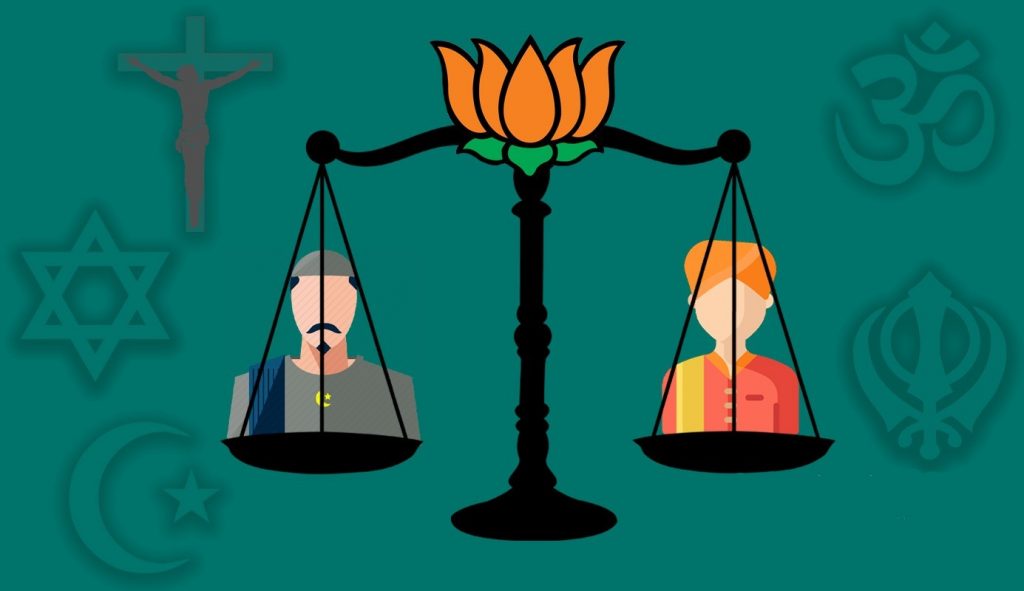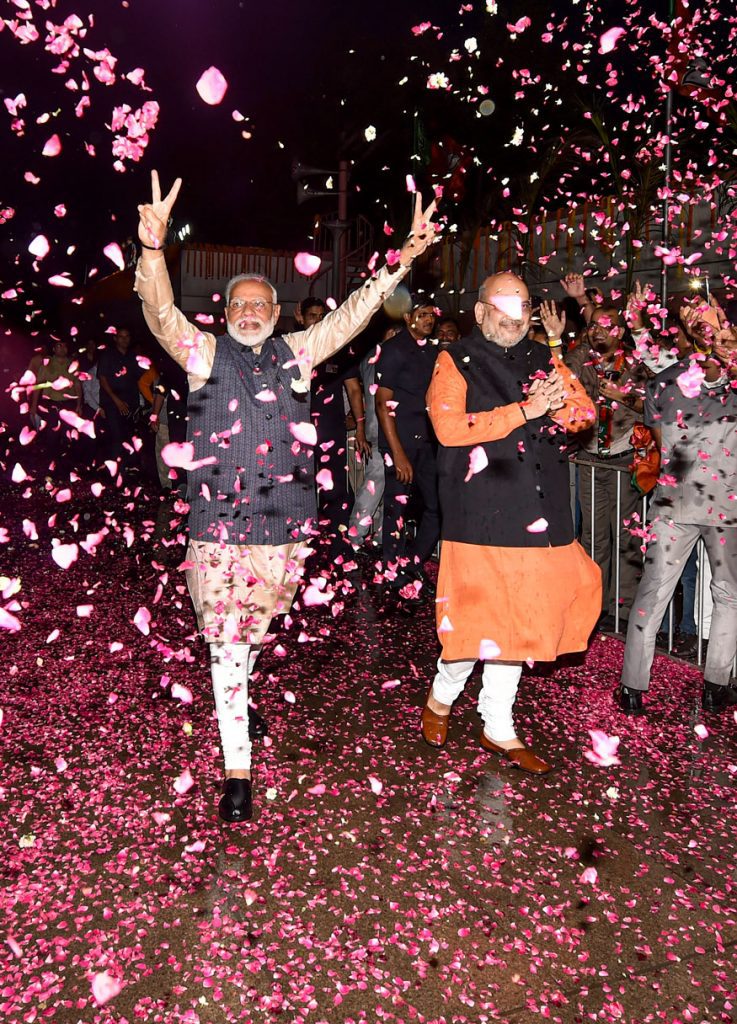
The term secularism holds basic esteem among the individuals of India. The concept of faith has continuously been used as a methodology by the authorities and forums in conjunction with their governing bodies. Uniform Civil Code places a set of laws to control the affairs of all citizens belonging to any of the religions and is probably the necessity of the hour and it will guarantee that their fundamental and sacred rights are protected at any cost. Uniform Civil Code (UCC) is defined in our Constitution under Article 44 of Directive Principles of State Policy. It states that it is the duty of the State to secure for the citizens a Uniform Civil Code all through the region of India.
In other words, we can say that it implies one nation one rule. A Uniform Civil Code alludes to a single law, applicable to all citizens of India in their personal matters such as marriage, divorce, guardianship, adoption, and inheritance. It is planning to supplant the framework of fragmented personal laws, which right now governs interpersonal relationships and related matters within diverse religious communities.
The provisions contained in this Part shall not be enforceable by any Court, but the principles therein laid down are nevertheless fundamental in the governance of the country and it shall be the duty of the State to apply these principles in making laws.
Article 37 Constitution of India
This viably implies that the vision of a Uniform Civil Code is revered in the Indian Constitution as an objective towards which the country ought to endeavour, but it isn’t a Fundamental Right or a Constitutional guarantee. One can’t approach the Court to request a UCC.
Importance of Article 44
The objective of Article 44 of the Directive Principles of State Policy in the Indian Constitution was to address the discrimination against vulnerable communities of our country and harmonize diverse cultural groups across the nation. Dr. B R Ambedkar, while defining the Constitution had said that a UCC is desirable but for the moment it ought to stay voluntary, and hence the Article 35 of the draft Constitution was included as a portion of the Directive Principles of the State Policy in part IV of the Constitution of India as Article 44. It was incorporated within the Constitution as an angle that would be fulfilled when the country would be prepared to acknowledge it and the social acceptance to the UCC could be made.
Dr. Ambedkar in his speech in the Constituent Assembly had said, ‘No one need be apprehensive that if the State has the power, the State will immediately proceed to execute…that power in a manner may be found to be objectionable by the Muslims or by the Christians or by any other community. I think it would be a mad Government if it did so.‘
Role of other Articles in the Indian Constitution
- Article 25 states Freedom of conscience and free profession, practise, and propagation of religion. So, the UCC cannot be commandingly forced on the individuals as at that point it’ll be clearly an infringement of Article 25 of the Indian Constitution. In this manner, UCC and individual laws ought to co-exist. UCC is nothing but the joining of advanced and progressive perspectives for all existing personal laws which can’t be disregarded.
- Article 26(b) upholds the right of each religious category or any segment thereof to “manage its claim affairs in matters of religion”
- Article 29 defines the right to preserve a particular culture.
- These rights get into conflict with equality before law revered under Articles 14 and 15.
Origin of Uniform Civil Code
The origin of the UCC dates back to colonial India when the British Government submitted its report in 1835 stressing over the requirement for uniformity within the codification of Indian law relating to violations, evidence, and contracts, particularly prescribing those personal laws of Hindus and Muslims be kept outside such codification.
The demand for a UCC came to the light in the judgment articulated within the Shah Bano Case in 1985, more than three decades after the Constitution was drafted. Shah Bano moved Supreme Court looking for maintenance after her spouse separated from her after 40 years of marriage by giving triple talaq and denied her regular maintenance. The SC bench, in a verdict in support of Bano, observed: ‘There is no evidence of any official activity for framing a common Civil Code for the country. A common Civil Code will help the cause of national integration by removing disparate loyalties to laws which have conflicting ideologies.‘
In the 1995 Sarla Mudgal Case, Justice Kuldip Singh repeated the requirement for Parliament to outline a Uniform Civil Code, which would offer assistance to the cause of national integration by removing ideological contradictions. The same proposal reflects in the verdict of other landmark cases such as Jordan Diengdeh vs. SS Chopra and John Vallamattom vs. Union of India.
Uniform Civil Code in India

During the month of August 2018, the Law Commission submitted a report titled ‘Reform of Family Law‘. The report presents us with the diversity of Indian culture and how the weaker segments of the society must not be ‘dis-privileged‘ in the process. Moreover, this indicated the reality that the Commission dealt with laws that are discriminatory instead of introducing a Uniform Civil Code which is neither fundamental nonetheless desirable. There have been a number of petitions with respect to the urgent need to introduce the Uniform Civil Code in order to advance national integration as well as gender equity, uniformity & respect of females. The petitions also point that the Uniform Civil Code would replace the personal laws, based on the sacred writings and traditions of different devout communities, with a common set of rules overseeing each citizen of the nation.
In its pronouncement or Sankalp Patra released on 8 April, before the 2019 Lok Sabha elections, the BJP repeated its stand to draft a Uniform Civil Code to bargain with personal laws in India. It cited Article 44 of the Constitution, as well as gender equality as the reasons behind why a UCC ought to be drafted, claiming that it’ll secure the rights of all women, ‘drawing upon the best traditions and harmonizing them with the modern times.‘
The Bharatiya Janata Party has guaranteed a UCC in each manifesto since 1998 but hasn’t taken any action whatsoever, including when it had a solid mandate, much obliged by the ‘Modi wave’ in 2014. Despite the developing buzz, the likelihood of Uniform Civil Code being drafted and passed in the near future is vague, since minorities have the most to lose from an ineffectively drafted UCC (which is likely to be the case in a hurried enactment) and are beyond any doubt to raise concerns.
Why should it be implemented?
- National Integration
A unified code is important, both for the assurance of the weaker sections in the Indian society (women and religious minorities) and for the advancement of national unity and solidarity. A lot of ill will is caused by preferential treatment by the law of certain devout communities and this may be avoided by a Uniform Civil Code. It’ll offer assistance in bringing each Indian, in spite of his caste, religion, or tribe, beneath one national civil code of conduct. - It Promotes Real Secularism
What we have presently in India is selective secularism which implies that in a few zones we are secular and in others, we aren’t. A Uniform Civil Code implies that all citizens of India need to take after the same laws whether they are Hindus or Muslims or Christians or Sikhs. This sounds reasonable and secular. A Uniform Civil Code doesn’t mean it’ll constrain the opportunity of individuals to follow their religion, it just implies that each individual will be treated the same; which can be considered as genuine secularism. - Simplification of Indian Legal System and Laws
There exist numerous personal laws like Hindu Code Bill, Shariat Law, etc. The presence of so many laws causes disarray, complexity, and irregularities within the settlement of personal matters, at times leading to delayed justice or no justice. UCC will dispose of this overlapping of laws. UCC will lead to a decrease in litigation emanating from numerous personal laws.

- Personal Laws are a Loop Hole
The different personal laws are basically a loophole to be misused by those who have control. Our Panchayats proceed to grant judgments that are against our structure and we don’t do anything about it. Human rights are violated through honour killings and female feticide all around our nation. By permitting personal laws, we have constituted an alternate legal framework that still operates on thousands of years’ ancient values. A Uniform Civil Code would alter that. - It will help in reducing Vote Bank Politics
A Uniform Civil Code will also offer assistance in decreasing vote bank politics that most political parties enjoy amid each election. In the event that all religions are secured beneath the same laws, the lawmakers will have less to offer to certain minorities in the trade of their vote. Not having a Uniform Civil Code is a hindrance to genuine democracy and that should change. - Gender Justice
The rights of women are ordinarily restricted beneath the patriarchal discourse through religious laws. UCC will free women from patriarchal mastery and give them the right to equality and liberty.
Conclusion
Communities ought to be convinced that UCC is to bring about reforms not smother them and it’ll never intend to meddle with the rights, rituals, ceremonies, or devout convictions of a community. It should be a piecemeal change rather than an all-encompassing change beginning with what minorities are most comfortable with doing away. The UCC must carve a balance between the protection of Fundamental Rights and Religious Doctrines of people. It ought to be a code, which is fair and appropriate concurring to a man of standard judiciousness, without any inclination with respect to religious and political contemplations.
The UCC aims to provide protection to vulnerable segments as conceived by Ambedkar including women and religious minorities, whereas also advancing nationalistic enthusiasm through solidarity. When enacted the Code will work to disentangle laws that are segregated at present on the basis of religious convictions just like the Hindu Code Bill, Shariat Law, and others. The code will simplify the complex laws around marriage ceremonies, legacy, succession, adoptions making them one for all. The same civil law will then be pertinent to all citizens irrespective of their faith. According to my point of view for a perfect state UCC would be an ideal safeguard of citizens’ rights. Its appropriation will be progressive enactment. With changing times, the requirement has emerged for having a Common Civil Code for all citizens, independent of religion, guaranteeing that their Fundamental and Sacred Rights are secured. Indeed, Secularism and National Keenness can moreover be fortified by introducing UCC.
Editor’s Note
Since long, there have been various debates for and against the implementation of a Uniform Civil Code in India. This article gives a basic understanding of what is UCC, what was its origin, its Constitutional backing as well as the views put forward for its implementation by the Supreme Court in various cases. Lastly, the author has given six major reasons in favour of the implementation of a Uniform Civil Code in India. It is hoped that in the near future an effective solution for this ongoing debate will be found and implemented in the interest of all.